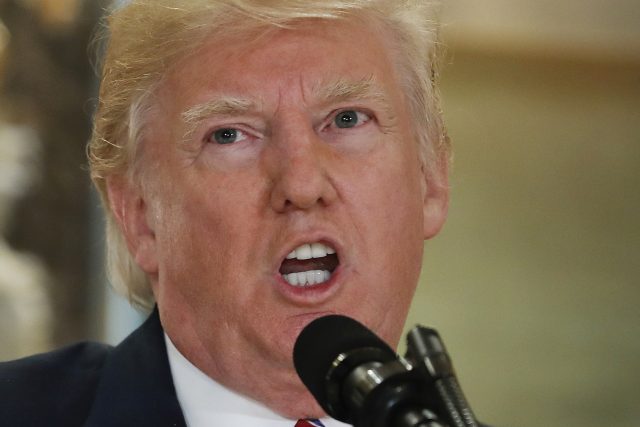
US President Donald Trump has decried the rising movement to pull down monuments to leading Confederate figures, declaring that the nation is seeing “the history and culture of our great country being ripped apart”.
Mr Trump’s remarks came as the White House tried to manage his increasing isolation and the continued fallout from his combative comments on last weekend’s racially charged violence in Charlottesville, Virginia.
Sad to see the history and culture of our great country being ripped apart with the removal of our beautiful statues and monuments. You…..
— Donald J. Trump (@realDonaldTrump) August 17, 2017
…can't change history, but you can learn from it. Robert E Lee, Stonewall Jackson – who's next, Washington, Jefferson? So foolish! Also…
— Donald J. Trump (@realDonaldTrump) August 17, 2017
…the beauty that is being taken out of our cities, towns and parks will be greatly missed and never able to be comparably replaced!
— Donald J. Trump (@realDonaldTrump) August 17, 2017
He also tore into fellow Republicans who have criticised his statements on race and politics, fanning the controversy towards a fully fledged national conflagration.
Pressured by advisers, the president had taken a step back from the dispute on Monday, two days after he had enraged many by declining to single out the white supremacists and neo-Nazis whose demonstration against the removal of a Robert E Lee statute had led to violence and the death of a counter-protester in Charlottesville.
He returned to his combative stance on Wednesday – insisting anew that “both sides” were to blame.
 Donald Trump (Pablo Martinez Monsivais/AP)
Donald Trump (Pablo Martinez Monsivais/AP)
And then in a burst of tweets on Thursday he renewed his criticism of efforts to remove memorials and tributes to the Civil War Confederacy.
“You can’t change history, but you can learn from it,” he tweeted. “Robert E. Lee. Stonewall Jackson – who’s next, Washington, Jefferson? So foolish. …
“Also the beauty that is being taken out of our cities, towns and parks will be greatly missed and never able to be comparably replaced!”
He was not talking about beauty in earlier tweets, lashing out at Republican senators Lindsey Graham and Jeff Flake.
Publicity seeking Lindsey Graham falsely stated that I said there is moral equivalency between the KKK, neo-Nazis & white supremacists……
— Donald J. Trump (@realDonaldTrump) August 17, 2017
…and people like Ms. Heyer. Such a disgusting lie. He just can't forget his election trouncing.The people of South Carolina will remember!
— Donald J. Trump (@realDonaldTrump) August 17, 2017
He accused “publicity-seeking” Mr Graham of falsely stating his position on the demonstrators, called Mr Flake “toxic” and praised a Flake primary election opponent.
Mr Graham said on Wednesday that Mr Trump “took a step backward by again suggesting there is moral equivalency” between the marching white supremacists and the people who had been demonstrating against them.
Mr Flake has been increasingly critical of Mr Trump in recent weeks.
Great to see that Dr. Kelli Ward is running against Flake Jeff Flake, who is WEAK on borders, crime and a non-factor in Senate. He's toxic!
— Donald J. Trump (@realDonaldTrump) August 17, 2017
Other Republicans, including the most powerful in Congress, have been making strong statements on Charlottesville and racism, but few have been mentioning Mr Trump himself.
The Senate’s top Republican, Majority Leader Mitch McConnell, condemned “hate and bigotry”.
Statement by Presidents George H.W. Bush and George W. Bush https://t.co/HpAty2Ovk6 pic.twitter.com/8JJNru7Q4j
— TheBushCenter (@TheBushCenter) August 16, 2017
House Speaker Paul Ryan said that “white supremacy is repulsive”.
But neither criticised the president’s insistence that there were “very fine people on both sides” of the violent weekend clash in Virginia.
The nuanced statements reflect the party establishment’s delicate dance.
Few top Republican officeholders want to defend the president in the midst of an escalating political crisis, yet they are unwilling to declare all-out opposition to him and risk alienating his loyalists.


Why are you making commenting on The Herald only available to subscribers?
It should have been a safe space for informed debate, somewhere for readers to discuss issues around the biggest stories of the day, but all too often the below the line comments on most websites have become bogged down by off-topic discussions and abuse.
heraldscotland.com is tackling this problem by allowing only subscribers to comment.
We are doing this to improve the experience for our loyal readers and we believe it will reduce the ability of trolls and troublemakers, who occasionally find their way onto our site, to abuse our journalists and readers. We also hope it will help the comments section fulfil its promise as a part of Scotland's conversation with itself.
We are lucky at The Herald. We are read by an informed, educated readership who can add their knowledge and insights to our stories.
That is invaluable.
We are making the subscriber-only change to support our valued readers, who tell us they don't want the site cluttered up with irrelevant comments, untruths and abuse.
In the past, the journalist’s job was to collect and distribute information to the audience. Technology means that readers can shape a discussion. We look forward to hearing from you on heraldscotland.com
Comments & Moderation
Readers’ comments: You are personally liable for the content of any comments you upload to this website, so please act responsibly. We do not pre-moderate or monitor readers’ comments appearing on our websites, but we do post-moderate in response to complaints we receive or otherwise when a potential problem comes to our attention. You can make a complaint by using the ‘report this post’ link . We may then apply our discretion under the user terms to amend or delete comments.
Post moderation is undertaken full-time 9am-6pm on weekdays, and on a part-time basis outwith those hours.
Read the rules hereComments are closed on this article